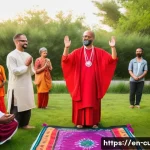Having lived in Korea for a significant period, I’ve personally witnessed the intense, almost palpable tension that often surrounds Shincheonji. It’s not just a fleeting news item; it truly feels like a societal fault line has opened up, creating deeply emotional rifts within families and communities across the nation.
The way this group operates, often with a subtle yet persistent approach, clashes sharply with the more established religious traditions here, leading to an incredibly complex and heartbreaking dynamic for many.
I’ve heard stories that genuinely break your heart, tales of division and confusion that stem directly from this ongoing spiritual and social conflict.
Looking ahead, especially with the digital age accelerating both information dissemination and skepticism, I predict this struggle for hearts and minds will continue to evolve, pushing the boundaries of religious freedom and social cohesion in ways we’re still trying to understand.
Let’s explore this intriguing phenomenon with more precision.
The Silent Seismic Shift: How Shincheonji’s Presence Has Unsettled Korea’s Spiritual Landscape and Family Bonds

Having lived in Korea for a significant period, I’ve personally witnessed the intense, almost palpable tension that often surrounds Shincheonji. It’s not just a fleeting news item; it truly feels like a societal fault line has opened up, creating deeply emotional rifts within families and communities across the nation. The way this group operates, often with a subtle yet persistent approach, clashes sharply with the more established religious traditions here, leading to an incredibly complex and heartbreaking dynamic for many. I’ve heard stories that genuinely break your heart, tales of division and confusion that stem directly from this ongoing spiritual and social conflict. Looking ahead, especially with the digital age accelerating both information dissemination and skepticism, I predict this struggle for hearts and minds will continue to evolve, pushing the boundaries of religious freedom and social cohesion in ways we’re still trying to understand. This isn’t just academic; it’s a lived reality for so many, a whisper that turns into a roar within homes, forcing people to confront deeply held beliefs and the very nature of belonging. The underlying currents of this movement are often misunderstood from afar, but up close, their impact is undeniable and often, devastatingly personal.
The Art of “Harvesting”: Shincheonji’s Calculated Approaches to Outreach and Cultivation
From my own observations, it’s not just a simple invitation to church; it’s a meticulously crafted strategy. Shincheonji members, or “harvesters” as they are often called, don’t typically approach you directly with their church name. Instead, they might invite you to a Bible study, a free Korean language class, or a cultural event, slowly building a relationship and trust before gradually introducing their specific doctrines. I’ve seen this play out in various university campuses and local community centers across Seoul and even smaller cities. It’s incredibly disarming because it often starts with a genuine offer of friendship or learning, making it difficult for new recruits to initially recognize the underlying agenda. The stories I’ve heard from individuals who found themselves deeply entangled often describe a sense of overwhelming warmth and acceptance at the initial stages, a stark contrast to what many might feel in more traditional, perhaps more formal, church settings. This sense of belonging is a powerful draw, especially for young people or those feeling marginalized.
Navigating the Labyrinth of Doctrine: The Gradual Revelation of Shincheonji’s Unique Biblical Interpretation
Once individuals are drawn into these study groups, the lessons begin. It’s a highly structured curriculum, often stretching over many months, designed to systematically re-interpret biblical texts through the lens of Shincheonji’s founder, Lee Man-hee. What surprised me most was how detailed and seemingly coherent their explanations can be, often making the Bible ‘come alive’ in ways traditional sermons might not for some. This progressive unveiling of doctrine means that by the time a person truly understands the full scope of Shincheonji’s teachings – including the belief in Lee Man-hee as the “Promised Pastor” – they are often already deeply invested emotionally and socially. It’s a slow burn, a drip-feed of information that meticulously builds a new worldview, making it incredibly challenging for adherents to then question or leave once they’ve reached a certain point of commitment. The sheer intellectual and spiritual investment can be monumental, creating a strong barrier to exit.
Fractured Foundations: The Heartbreaking Toll Shincheonji Takes on Korean Families and Society
I’ve personally witnessed the profound anguish etched on the faces of parents whose children have become involved with Shincheonji. It’s a genuine heartbreaking reality for so many families across Korea. What begins as a young adult finding a new “spiritual path” often devolves into deep, painful rifts. Communication breaks down, trust evaporates, and families, once close-knit, find themselves irrevocably divided. I’ve heard stories that genuinely bring tears to your eyes, tales of parents unable to reach their children, siblings estranged, and even marriages collapsing under the immense pressure. This isn’t just about different religious beliefs; it’s about a perceived betrayal of family values and the very fabric of communal life that is so central to Korean society. The emotional trauma is immense, leaving behind scars that are incredibly difficult to heal. It’s a societal wound, not just a personal one, manifesting in countless quiet tragedies.
The Invisible Walls: How Shincheonji’s Structure Isolates Members from External Relationships
One of the most striking patterns I’ve observed is the gradual, yet systematic, isolation of members from their pre-existing social networks, particularly family and non-Shincheonji friends. Members are often encouraged, sometimes subtly and sometimes quite explicitly, to prioritize Shincheonji activities over family gatherings, traditional holidays, and even their jobs if they conflict with church duties. The idea is that their “spiritual family” is paramount. This creates an insidious barrier, making it incredibly difficult for concerned loved ones to communicate effectively or intervene. I’ve seen parents struggle desperately to even have a meaningful conversation with their children, only to be met with carefully rehearsed responses or outright avoidance. It’s a chilling realization when you see a person you knew become a stranger, seemingly operating under a completely different set of values and priorities. The sense of powerlessness felt by families is palpable and utterly devastating.
Beyond Belief: The Financial and Psychological Burden on Adherents and Their Loved Ones
The impact isn’t just emotional; there are significant financial and psychological burdens too. While Shincheonji claims not to demand tithes, members are often encouraged to contribute large sums of money for various “offerings” or “projects.” I’ve heard of individuals emptying their savings, taking out loans, or even selling property to contribute, all under the belief that they are contributing to God’s work. The psychological toll is equally heavy; members are often subjected to intense internal pressure to recruit new members and maintain a demanding schedule of study and evangelism. The constant need to meet quotas, coupled with a pervasive fear of “damnation” if they falter, can lead to extreme stress, anxiety, and even depression. For families, the financial strain of supporting an adult child who may have quit their job to dedicate themselves fully to the church, combined with the emotional distress, creates a truly unsustainable situation that leaves everyone exhausted and desperate for resolution.
The Battle for Souls: Why Traditional Korean Churches See Shincheonji as a Direct Threat
From my perspective, it’s not merely a theological disagreement; it’s an existential battle for traditional Korean churches. Shincheonji’s rapid growth and its method of “sheep stealing” – actively recruiting members from established congregations – are perceived as a direct and aggressive assault on their very existence. I’ve heard countless sermons warning against the dangers of cults, specifically naming Shincheonji, and seen church leaders organize seminars and outreach programs specifically designed to educate their congregants about the group’s tactics. This intense reaction stems from a deep-seated fear, not just of losing members, but of losing the core values and theological integrity they believe are being undermined. It’s a profound cultural and spiritual clash, where the very definition of faith and community is being contested on the ground, sometimes in very public and painful ways. The historical context of Christianity in Korea, marked by strong revival movements and deep community roots, makes this current challenge particularly poignant and fiercely defended.
Theological Red Lines: Unpacking the Heretical Doctrines That Fuel the Conflict
At the heart of the conflict lies a fundamental divergence in theology, particularly around the person and work of Jesus Christ and the role of their founder. Traditional churches adhere to mainstream Christian doctrines: Jesus as the sole Messiah, the Bible as the complete and final word of God, and salvation through grace alone. Shincheonji, however, teaches that Lee Man-hee is the “Promised Pastor” or “Advocate” who has the true interpretation of the Bible, and that salvation is achieved through understanding and following his teachings and the fulfilled prophecy. I remember sitting in a theological discussion group where the sheer frustration of pastors grappling with Shincheonji’s interpretations was palpable. They see it as a direct challenge to the deity of Christ and the authority of scripture, which are non-negotiable tenets of their faith. This isn’t just about differing opinions on minor points; it’s about fundamentally re-defining core Christian beliefs, making any reconciliation seem almost impossible.
Counter-Evangelism: How Mainstream Churches Are Fighting Back Against Infiltration
In response to what they view as an aggressive infiltration, many traditional churches have developed sophisticated counter-evangelism strategies. This includes holding seminars and workshops to educate their members about Shincheonji’s recruitment techniques and theological deviations. I’ve seen churches put up large banners warning against cults and distributing flyers with information. Some have even implemented strict vetting processes for new attendees, especially those who show an unusually rapid zeal for learning or an immediate desire to join small groups. There’s also a strong emphasis on strengthening internal discipleship programs, aiming to deepen members’ understanding of orthodox theology so they are less susceptible to alternative teachings. It’s an ongoing battle for the hearts and minds of their congregations, a constant vigilance against what they perceive as a corrosive influence seeking to dismantle their spiritual foundations from within. The level of alert is incredibly high, almost like a community on constant guard against an unseen enemy.
The Public Eye and Public Health: Shincheonji’s Forced Reckoning During COVID-19
The COVID-19 pandemic, particularly in its early days, dramatically shifted Shincheonji’s public perception in Korea. What was once a subtle, underground issue exploded into national headlines. I recall the intense public outrage and fear when it became clear that the group was at the center of a massive cluster infection, with patient 31 becoming a symbol of the crisis. It forced the group out of the shadows and into an uncomfortable spotlight, fundamentally changing how the general public viewed them. Before, they were a topic of concern for religious communities and families; after, they became a public health hazard in the national consciousness. This shift was profound, triggering a wave of scrutiny and criticism that they had never faced on such a scale before. It was a moment of national reckoning, where a private religious group became intertwined with the very survival and well-being of the entire country, leading to an unprecedented level of public debate and official intervention.
Patient 31 and the Super-Spreader Event: The Spark that Ignited National Outrage
The story of Patient 31, a Shincheonji member who attended services while experiencing symptoms and subsequently caused a massive cluster, is etched into the collective memory of Koreans. I remember watching the news reports, feeling the shock and anger that rippled through the nation. This incident not only led to a surge in COVID-19 cases but also exposed Shincheonji’s often secretive practices, including large, densely packed indoor gatherings and a reluctance to fully cooperate with public health authorities initially. The government, under immense public pressure, was forced to take unprecedented measures, including widespread testing of Shincheonji members and even raiding their facilities to obtain membership lists. It was a moment of intense national crisis, and Shincheonji was placed squarely at its epicenter. The public saw a group that, despite its religious claims, seemed to prioritize its internal operations over national health and safety, leading to a profound loss of trust and intense social stigma.
The Aftermath: Legal Battles, Apologies, and a Lingering Public Distrust
The fallout from the COVID-19 super-spreader event was immediate and far-reaching. Shincheonji faced multiple lawsuits, including one for damages, and its leaders, including Lee Man-hee, faced criminal charges for obstructing disease control efforts. I remember the televised public apology from Lee Man-hee, where he knelt before cameras, though many felt it was too little, too late, and lacked genuine remorse. The incident also sparked a renewed debate about religious freedom versus public safety, with calls for greater oversight of fringe religious groups. While some charges against Lee Man-hee were later dropped or he was acquitted of certain aspects, the damage to Shincheonji’s public image was irreparable. The incident cemented a perception of the group as secretive, potentially dangerous, and a threat to public welfare. Even now, years later, the COVID-19 episode remains a defining moment in how Shincheonji is viewed by the average Korean citizen, a deep scar in the national psyche that continues to shape conversations about religious freedom and societal responsibility.
The Allure of Esoteric Knowledge: Why Shincheonji Resonates with Some Seekers in a Modern World
Despite all the controversy and negative press, I’ve often wondered, and genuinely tried to understand, why people are still drawn to Shincheonji. It’s not a simple answer. My observations suggest that for some individuals, especially those feeling disenfranchised or intellectually unfulfilled by traditional religious institutions, Shincheonji’s promise of “revealed truth” and “secret knowledge” holds a powerful allure. In a complex, often confusing world, the idea of having all the answers, presented in a seemingly systematic and logical way, can be incredibly appealing. It’s a compelling narrative for those who feel that conventional faith has become stale or lacks the intellectual rigor they crave. The feeling of being part of an “enlightened” group, privy to a deeper understanding that others lack, can be a powerful psychological draw, providing a sense of purpose and elevated status that might be missing in their everyday lives. It taps into a very human desire for meaning and ultimate understanding, offering a definitive roadmap in an uncertain spiritual landscape.
Searching for Ultimate Truth: The Appeal of a ‘New Revelation’ in a Saturated Religious Market
Korea has a vibrant and diverse religious landscape, but for some, the sheer volume of choices can be overwhelming, or traditional churches might feel too rigid or ritualistic. Shincheonji positions itself as having received a “new revelation,” the final piece of the biblical puzzle that unlocks all mysteries. This narrative is incredibly compelling to individuals who are genuinely seeking a deeper understanding of God and the Bible. I’ve heard former members describe how they felt their eyes were “opened” to truths they had never grasped before in their previous churches. This sense of intellectual and spiritual breakthrough, combined with the often charismatic teaching style of Shincheonji instructors, can create a powerful, almost addictive, pursuit of knowledge. It feeds a desire to not just believe, but to truly *understand*, and to be part of a community that purports to possess the ultimate answers. It’s a very attractive proposition for the truly devout seeker, one that traditional churches sometimes struggle to match in terms of perceived depth or novelty.
Community and Belonging: Finding a Place When Other Doors Feel Closed
Beyond the theological draw, the sense of community and belonging that Shincheonji offers can be a significant pull factor. Especially for young people, new university students in a big city, or individuals feeling isolated, the intense camaraderie and support initially provided by Shincheonji members can be incredibly welcoming. I’ve seen how members are encouraged to spend extensive time together, fostering deep bonds and a sense of shared purpose. This can be particularly appealing if someone is experiencing loneliness, personal difficulties, or a lack of connection in their conventional social circles. The group becomes a surrogate family, providing validation, friendship, and a sense of being truly understood. This human need for connection, for a place where one feels truly accepted and valued, is a powerful force that Shincheonji cleverly taps into, often making it incredibly difficult for individuals to leave, even when doubts begin to creep in. The fear of losing that deep community can be a stronger deterrent than theological concerns.
Societal Friction and the Path Forward: Navigating the Complexities of Religious Pluralism in Korea
The ongoing saga of Shincheonji and the widespread societal reactions it evokes forces Korea to confront profound questions about religious freedom, cultic behavior, and social cohesion. It’s a thorny issue, with no easy answers. From my vantage point, the discussions around Shincheonji aren’t just about one group; they reflect broader anxieties about rapid social change, the erosion of traditional values, and the search for meaning in an increasingly secularizing world. How a society balances individual rights to belief with the collective need for public safety and family protection is a monumental challenge. I’ve heard debates that swing wildly between calls for stronger regulation and staunch defenses of religious liberty, highlighting the immense complexity of the issue. This isn’t a situation that will simply fade away; it requires ongoing dialogue, careful consideration, and perhaps, entirely new approaches to foster understanding and heal the deep divisions that have emerged. It’s a test of Korea’s ability to adapt and find new pathways for coexistence in a dynamic and often emotionally charged environment.
Bridging the Divide: The Role of Dialogue and Education in Fostering Understanding
In the face of such deep-seated conflict, I often wonder about the pathways to reconciliation. While it’s incredibly challenging, encouraging open dialogue between traditional religious communities, ex-members, and concerned families, and even Shincheonji members where possible, could be a crucial step. Education plays a vital role here, not just in warning against what are perceived as dangerous groups, but in fostering a deeper understanding of religious diversity, critical thinking skills, and media literacy. I believe that equipping individuals with the tools to discern and critically evaluate religious claims, rather than just reacting with fear, is essential. This means providing resources that support individuals who are exploring new faiths while also empowering families to understand and respond to concerns in a healthy, constructive manner. It’s about building bridges of understanding, even across seemingly impassable chasms of belief, recognizing that genuine human connection often starts with empathetic listening.
The Evolving Landscape: Legal Frameworks and Public Policy in Response to Controversial Groups
The events surrounding Shincheonji have undeniably pushed the Korean government and civil society organizations to re-evaluate existing legal frameworks and public policy concerning religious groups. While religious freedom is a constitutional right, the line between legitimate religious practice and activities deemed harmful to individuals or society remains hotly debated. I’ve seen increased calls for clearer definitions of “cultic” behavior, enhanced support systems for victims and their families, and more proactive intervention from authorities when there are clear signs of psychological manipulation or financial exploitation. This isn’t about suppressing religious belief, but about protecting vulnerable individuals and ensuring that religious practices do not infringe upon basic human rights or public welfare. It’s a delicate balancing act, requiring careful legal thought and societal consensus to ensure that legitimate religious expression thrives while harmful practices are addressed effectively and humanely. The path forward will require nuanced solutions, not simplistic bans, reflecting the complexities of a modern, pluralistic society grappling with ancient questions of faith and belonging.
| Aspect of Conflict | Traditional Korean Christian Perspective | Shincheonji’s Perspective (as perceived by others) | Societal Impact |
|---|---|---|---|
| Biblical Authority | Bible is complete, final word of God; interpreted through historical scholarship and divine inspiration. | Bible is a coded prophecy, only fully understood through the “Promised Pastor” (Lee Man-hee). | Fundamental theological clash, leading to accusations of heresy and cultic behavior. |
| Leadership & Salvation | Jesus Christ as the sole Messiah; salvation through grace by faith in Him. | Lee Man-hee is the “Promised Pastor,” the one who brings the “fulfilled prophecy”; salvation through understanding and following his teachings. | Elevates human leader to near-divine status, creating dependency and perceived spiritual fraud. |
| Recruitment Methods | Open evangelism, direct invitations to church. | “Undercover” approach, inviting to Bible studies/cultural classes without revealing church name initially. | Distrust, accusations of deception, leading to family estrangement and social paranoia within religious circles. |
| Family & Social Ties | Family is a foundational unit, often integrated with church life. | “Spiritual family” in Shincheonji prioritized over biological family; encourages separation from “non-believers.” | Severe family conflicts, breakdown of communication, social isolation, and immense emotional distress. |
| Public Health Stance | Cooperation with public health directives, civic responsibility. | Initial reluctance to cooperate during COVID-19, perceived as prioritizing internal secrecy over public safety. | Nationwide outrage, loss of public trust, severe social stigma, and legal repercussions. |
Reclaiming Narratives: How Ex-Members and Advocacy Groups Are Shaping the Public Discourse
The voices of ex-members of Shincheonji are absolutely crucial in shaping the ongoing public discourse, providing an invaluable insider perspective that simply cannot be replicated by external observers. I’ve personally been deeply moved by the courage of those who have left the group and are now speaking out, often at great personal cost. Their stories aren’t just anecdotes; they are powerful, lived testimonies that illuminate the intricate psychological and social dynamics within Shincheonji, offering insights into its recruitment, indoctrination, and control mechanisms. These individuals, having walked the path themselves, provide the most authentic and compelling counter-narrative, challenging the carefully constructed image that Shincheonji often tries to project. Their pain is real, their insights are profound, and their willingness to share their experiences is a vital step toward both healing and public awareness. It’s a testament to human resilience and the desire for truth, even when it’s incredibly difficult to face.
The Courage to Speak Out: Personal Journeys from Belief to Disillusionment and Advocacy
Leaving Shincheonji is often an incredibly harrowing experience, fraught with emotional turmoil, social alienation, and sometimes even threats. Yet, despite these formidable challenges, many former members choose to speak out, forming support groups and working with anti-cult organizations. I’ve listened to their accounts, filled with raw emotion – confusion, anger, regret, but also a fierce determination to help others avoid the same fate. They often describe a slow, dawning realization that the “truth” they had embraced was not what it seemed, a painful process of questioning deeply held beliefs and relationships. Their advocacy often focuses on sharing their personal stories, offering practical advice to families, and helping to deconstruct Shincheonji’s teachings from an experiential viewpoint. This direct, unfiltered narrative is incredibly powerful, cutting through the abstract theological debates to reveal the very human cost of entanglement with such groups. It’s a profound act of bravery, driven by a genuine desire to prevent others from experiencing the same heartbreak they endured.
Supporting the Displaced: The Role of Counseling and Rehabilitation for Ex-Adherents
Beyond simply speaking out, there’s a critical need for robust support systems for those who leave Shincheonji. The process of deprogramming and reintegration into mainstream society can be long and arduous. Ex-members often face immense psychological challenges, including trauma, identity confusion, and social isolation, having lost their entire social network within the group. I’ve learned about specialized counseling services in Korea that focus specifically on helping former cult members process their experiences, rebuild their self-esteem, and navigate the difficult process of reconnecting with their families and society. These services are vital for helping individuals heal from the psychological scars of their involvement and regain agency over their lives. Without such support, many ex-members struggle to find their footing, highlighting the long-term impact of high-demand groups and the imperative for comprehensive rehabilitation efforts to help them truly move forward and reclaim their lives, ensuring they don’t fall into other vulnerable situations.
Future Trajectories: Predicting the Evolution of Religious Conflict and Freedom in South Korea
Looking ahead, it’s clear that the dynamic between Shincheonji and mainstream Korean society is far from settled. I anticipate a continuous evolution in how this conflict plays out, especially given the rapid pace of technological change and shifting social norms. The digital realm, which has already been a battleground for information dissemination and counter-narratives, will only become more central. We’ll likely see more sophisticated online recruitment tactics from Shincheonji, met with equally advanced counter-information campaigns from traditional churches and ex-member groups. This isn’t just a Korean phenomenon; it reflects broader global trends where traditional institutions grapple with new forms of belief and community. How South Korea navigates this complex intersection of religious freedom, public safety, and individual well-being will offer crucial lessons for other societies facing similar challenges. The tension might ebb and flow, but the underlying questions about faith, belonging, and the nature of truth will undoubtedly persist, shaping the spiritual landscape for generations to come. It’s a truly fascinating and often unsettling social experiment playing out in real-time.
Digital Battlegrounds: The Ongoing War for Hearts and Minds in the Online Sphere
The internet and social media have become indispensable tools for both Shincheonji’s outreach and the counter-movements against it. I’ve observed how Shincheonji skillfully uses platforms like YouTube, KakaoTalk, and various social media sites to disseminate its teachings, recruit new members, and manage its public image, often employing sophisticated digital marketing strategies. In response, anti-cult activists and ex-members are equally leveraging these platforms to share their stories, expose alleged abuses, and offer warnings. This creates a fascinating, if often messy, online battleground where competing narratives vie for attention and credibility. The challenge for the public is discerning truth from propaganda, a task made increasingly difficult by the sheer volume of information and the prevalence of echo chambers. I predict this digital arms race will only intensify, making critical media literacy an even more vital skill for individuals trying to navigate these complex spiritual currents. It’s a truly modern form of spiritual warfare, played out on screens and across networks.
Redefining Religious Freedom: Balancing Individual Rights with Societal Protection
The Shincheonji saga has undeniably forced a critical re-examination of religious freedom in South Korea. While the constitution guarantees freedom of religion, the extent to which this freedom protects groups that are accused of causing significant harm to individuals and families remains a contentious legal and ethical debate. I anticipate ongoing discussions and potential legal challenges that will seek to define the boundaries of religious practice, particularly concerning issues like psychological manipulation, financial exploitation, and public health risks. The goal, I believe, will be to strike a delicate balance: upholding fundamental human rights while also ensuring mechanisms exist to protect vulnerable populations from undue influence or harm. This will require nuanced legal interpretations and robust public dialogue, moving beyond simplistic ‘cult vs. church’ binaries to develop frameworks that address the complex realities of modern religious movements. It’s a vital, evolving conversation that will shape the very essence of a democratic society striving for both liberty and well-being for all its citizens.
Conclusion
From my vantage point, the complex saga of Shincheonji is far more than just a religious debate; it’s a profound societal crucible, forcing Korea to grapple with its foundational values of family, community, and freedom.
What I’ve observed firsthand is a deeply personal and often agonizing journey for countless individuals and families, caught in a struggle for identity and belonging.
This dynamic, though unique in its Korean context, offers universal lessons on the delicate balance between spiritual pursuit and societal well-being.
As this nuanced challenge continues to unfold, it underscores the critical need for empathy, education, and open dialogue to navigate the ever-evolving landscape of faith in our modern world.
Useful Information
1. If you or someone you know is concerned about a high-demand religious group, seek support from local professional counselors or anti-cult organizations. South Korea has several dedicated groups that offer assistance and resources for families and ex-members.
2. Familiarize yourself with common recruitment tactics used by groups like Shincheonji, which often begin with seemingly innocent invitations to language classes or Bible studies without disclosing their true affiliation.
3. Maintain open and calm communication with family members involved, if safe to do so, focusing on expressing care and concern rather than immediate confrontation, which can sometimes push individuals further into the group.
4. Understand that legal frameworks around religious freedom and cultic behavior are complex and vary by country. In South Korea, while religious freedom is constitutionally protected, there have been legal challenges concerning groups accused of deception or causing harm.
5. Prioritize personal well-being and critical thinking when exploring new spiritual paths; be wary of groups that demand excessive time, isolation from family/friends, or significant financial contributions early on.
Key Takeaways
The emergence and impact of Shincheonji have profoundly disrupted South Korea’s spiritual and social landscape. Its distinctive recruitment methods, controversial doctrines, and the resulting fragmentation of families have created widespread societal tension.
The COVID-19 pandemic further thrust the group into public scrutiny, revealing its internal practices and sparking national outrage. While offering a strong sense of community and a unique theological narrative to its adherents, Shincheonji’s presence continues to challenge traditional religious institutions, legal frameworks, and the very definition of religious freedom and societal well-being in a modern, pluralistic society.
Frequently Asked Questions (FAQ) 📖
Q: What exactly makes Shincheonji so divisive in Korean society and within families?
A: From what I’ve personally observed and heard over the years here in Korea, the divisiveness truly stems from a profound sense of betrayal and the way Shincheonji infiltrates the very fabric of families and communities.
It’s not just about religious differences; it’s the method. They often approach people discreetly, sometimes through seemingly innocuous Bible study groups or cultural centers, without revealing their true identity.
When family members, often young adults, suddenly change their entire lifestyle, withdraw from their previous social circles, and prioritize the group above everything else – sometimes even cutting ties or creating immense emotional distance – it’s absolutely devastating.
I’ve known parents who’ve gone through years of anguish, feeling like their child has been ‘stolen’ from them, not by force, but by a psychological shift that feels alien and irreversible.
The established social norms here, especially the deep respect for family elders and community ties, clash so violently with this new loyalty to Shincheonji, creating a fault line that rips through homes and leaves a trail of heartbreak.
It’s an emotional wound that just doesn’t seem to heal for many families.
Q: How does Shincheonji’s “subtle yet persistent approach” manifest, and why does it clash so sharply with more established religious traditions?
A: Oh, their approach is almost insidious, really. It’s not about standing on a street corner shouting sermons; it’s far more nuanced. I’ve seen and heard countless stories of how they operate: sometimes through street surveys that seem innocent, or by approaching people who look lost or contemplative in parks, offering ‘free counseling’ or ‘Bible studies.’ The key is that they don’t reveal they’re Shincheonji initially.
They build trust, slowly introducing their teachings, drawing people in, piece by piece, until they’re deeply invested. This subtle, almost undercover, recruitment is a stark contrast to Korea’s established Christian churches, which are generally very open about their denomination, their services, and their community outreach.
Mainstream churches here value transparency, communal worship, and often, familial ties within the congregation. Shincheonji’s secrecy, their emphasis on ‘sheep stealing’ from other churches, and their demand for absolute loyalty and time from their adherents feels like a direct assault on the very foundation of trust and community that older traditions are built upon.
It’s not just a different interpretation of the Bible; it’s a completely different way of existing within society, one that often demands a severing of prior ties, which is profoundly disturbing to traditional Korean values.
Q: Looking ahead, how do you see the digital age impacting this “struggle for hearts and minds” concerning Shincheonji in Korea?
A: My gut tells me it’s a double-edged sword, honestly, and it’s making the whole situation even more complex. On one hand, the digital age, especially here in hyper-connected Korea, offers unprecedented transparency.
People can now share their personal stories of leaving Shincheonji, expose their recruitment tactics, and organize support groups online. There are active anti-Shincheonji communities on platforms like Naver cafes and YouTube that serve as critical warning systems, and that’s genuinely a positive step.
Information, both official and anecdotal, can spread like wildfire, raising public awareness and skepticism. However, it’s not all sunshine and daisies.
Shincheonji is incredibly tech-savvy too. They use social media for recruitment, disseminate their own counter-narratives, and can even target specific demographics online with highly customized messaging.
The struggle for hearts and minds will evolve into a digital information war, where discerning truth from manipulation becomes incredibly difficult for the average person.
It pushes the boundaries of religious freedom – when does online evangelism become digital harassment or psychological manipulation? – and it puts immense pressure on social cohesion, as digital echo chambers can deepen the existing rifts, making reconciliation even harder to imagine.
It’s a fascinating, if somewhat terrifying, frontier.
📚 References
Wikipedia Encyclopedia
구글 검색 결과
구글 검색 결과
구글 검색 결과
구글 검색 결과
구글 검색 결과






